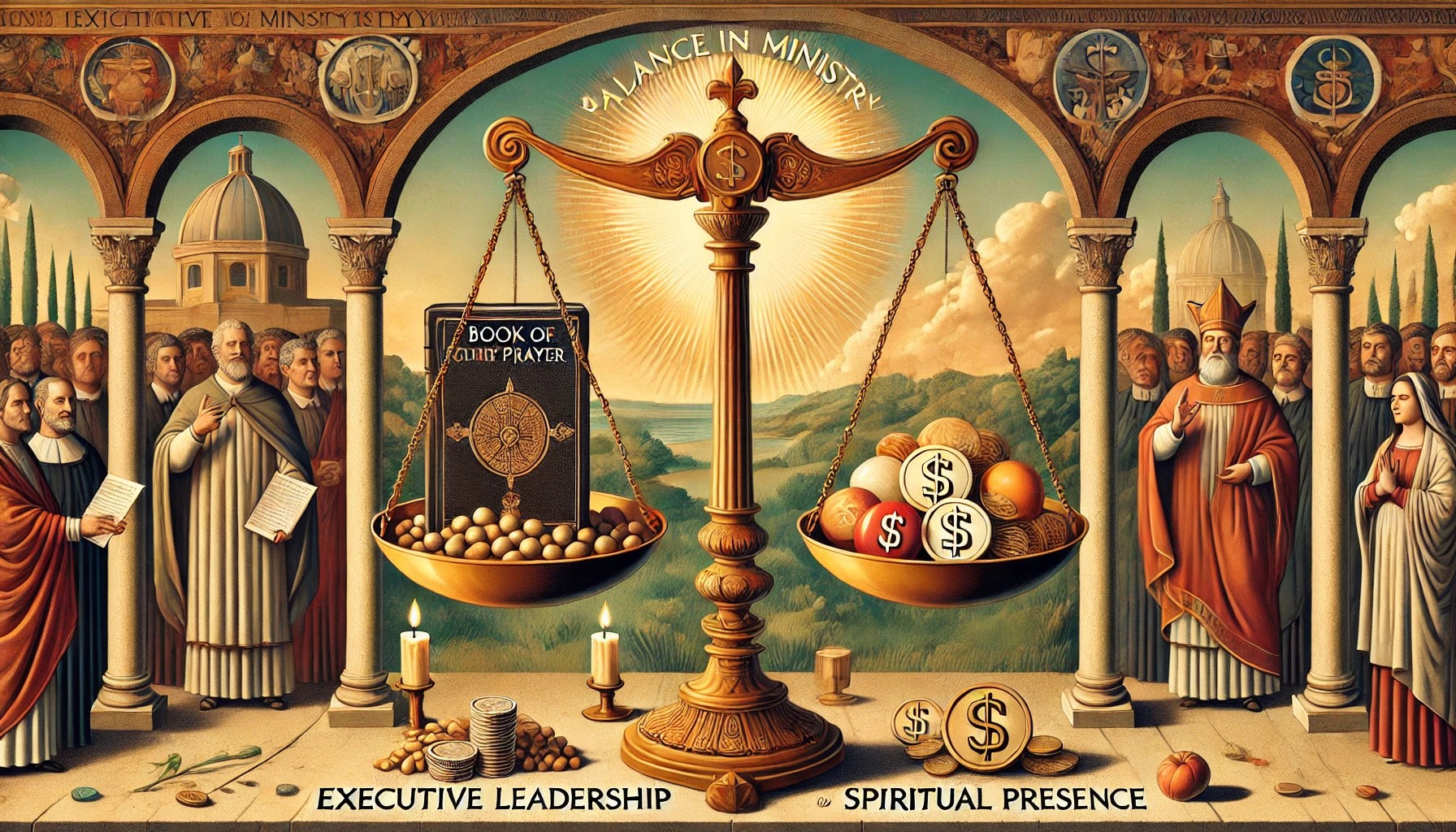The Crucial Role of Executive Function in Pastoral Ministry: Insights from Anglican Theology and Business Scholarship

Bridging Business Acumen and Pastoral Care for a Balanced Ministry–
I’ve written, rewritten, and edited this post countless times over the past six months. Finally, after a nudge from a good friend (thanks, SC+), I realized it was time to share. Executive function and pastoral leadership come up often in conversations about business and ministry, and they frequently overlap. This post aims to explore that overlap, acting as a conduit (or perhaps a capacitor) for insights into pastoral leadership through the lens of executive function.
My blog, The Priest and the Paradox: Walking Between Worlds, reflects my unique perspective as an Episcopal priest and a student of business and leadership. This dual role compels me to explore how executive-level strategies might deepen and support pastoral work. In the Anglican tradition of via media—the middle way—I’ve endeavored to balance these two realms, allowing each to offer its unique perspective on pastoral leadership and the continued ministry of Jesus today.
Today, clergy face diverse and dynamic demands, so exploring the intersection of executive function and pastoral ministry is crucial. This pursuit even led me to seek further education (Sorry, Amber… love you!!!). Now, this exploration isn’t complete or definitive. Have I treated it with the same rigor as a formal academic paper? Not quite. But I’ve put in significant effort, as my sources will show.
So, let this post serve as a starting point—one I hope will invite healthy criticism and dialogue among colleagues and friends. Let’s buckle up and dive into a reflection on executive function in pastoral ministry!
When people think of pastoral ministry, they often imagine a role rooted in prayer, sermon preparation, and spiritual guidance. While these are indeed central—and the central theme of our outdated seminary educational system—the reality is that pastoral work involves significant leadership functions, organizational skills, and, ironically, perhaps, logistical management.
Let’s start by defining executive function, a set of cognitive processes related to planning, decision-making, time management, and emotional regulation. These higher-order mental skills are not just theoretical concepts; they are essential for effective leadership in both business and ministry. They enable individuals to process information, set goals, adapt to new situations, and efficiently manage complex tasks. In the context of pastoral ministry, these abilities are crucial for strategic thinking, resilience under pressure, and making thoughtful, adaptive decisions in rapidly changing environments.

Stewardship of the Mind: Executive Function’s Intersection with Anglican Theology
That heading gives away the rest of the article… executive function can be considered part of the spiritual vocation to stewardship. Anglican theology has long held that stewardship extends beyond finances to encompass our time, talents, and mental resources (Book of Common Prayer, p. 856). In this light, executive function becomes a form of stewardship: how clergy manage time, plans, and leads responsibly and effectively can be viewed as an offering to God and the church community. Archbishop Rowan Williams suggests that Anglican spirituality often finds God not just in the extraordinary but in the “hidden detail of ordinary duties,” such as the careful use of resources, planning, and self-regulation (Williams, Being Christian). Developing executive function is not simply a matter of improving efficiency—it is a theological discipline.
As we delve deeper into the intersection of executive function and spiritual stewardship, it becomes essential to explore how these concepts manifest in pastoral ministry’s daily life.
1. Strategic Visioning and Planning: A Practical Application of Executive Function in Pastoral Ministry

Effective pastoral leadership requires more than intuition and inspiration; it calls for a clear and actionable vision. Strong executive function allows pastors to plan strategically, communicate a cohesive mission, and break down broad goals into manageable tasks. In the business world, strategic planning is foundational, as Harvard Business School professor Michael Porter emphasizes in his work on competitive advantage and organizational clarity when he says, “Strategy is about making choices, trade-offs; it’s about deliberately choosing to be different.” (Porter, Competitive Advantage). Similarly, for church leaders, vision-casting isn’t just about discerning direction but about translating that vision into daily and seasonal plans that guide the church forward.
Pastors can embrace strategic planning in a congregational setting by establishing key objectives and timelines for church growth, program development, and community outreach. Notably, Anglican ecclesiology underscores the importance of “discernment in community,” a process that invites clergy to listen to their congregations and incorporate diverse perspectives into strategic goals (Anglican Consultative Council, Mission in a Broken World). This combination of vision and strategic planning equips clergy to shepherd their communities with purpose, engaging members in a shared mission.
2. Decision-Making and Prioritization: Learning from Business Best Practices
Executive function plays a critical role in pastoral decision-making and prioritization. The daily demands of ministry are often complex, with urgent needs competing for attention alongside longer-term goals. Business research highlights the importance of prioritization for effective leadership; organizational experts David Allen and Tony Schwartz emphasize focusing on “high-impact” tasks to avoid burnout and maximize effectiveness (Allen, Getting Things Done; Schwartz, The Power of Full Engagement). Similarly, in pastoral work, knowing how to prioritize—and delegate—allows pastors to balance the immediate with the important.
Effectively prioritizing tasks also requires discernment. Anglican theology encourages clergy to engage in “ordered lives,” a concept rooted in monastic practices of balancing prayer, work, and rest (Chittister, Wisdom Distilled from the Daily). Prioritization is about discerning where God’s call is most vital in each moment. Pastors can cultivate this skill by setting aside time each day to assess tasks, weigh priorities, and make intentional choices about where to focus their energies.
3. Time Management and Task Coordination: Building a Healthy Ministry Rhythm
Time management is indispensable in pastoral work, where meetings, counseling sessions, liturgical planning, and community events can quickly fill a schedule. In business, leaders employ various tools—planners, project management software, scheduling apps—to keep organized and maintain visibility on critical projects. Similarly, pastors who adopt such tools can find themselves more capable of balancing these varied duties. Theologian L. Gregory Jones suggests that pastoral leadership must balance “kairos” (God’s time) with “chronos” (human time) to effectively engage in ministry (Jones, Christian Social Innovation).
Effective time management and coordination in church leadership hinge significantly on staffing a church well with skilled, adaptable people who understand both the spiritual mission and the necessary systems to support it. The struggle to keep doors open, recruit clergy, and retain committed staff in mainline churches reflects a growing need for intentional staffing that brings administrative, technical, and spiritual expertise. Episcopal priest and mental health advocate Dr. Bonnie Perry emphasizes, “Churches need leaders who know how to work with systems and who are resilient enough to deal with both the expected and unexpected. In the business world, Jim Collins, author of Good to Great, echoes this with his principle of “getting the right people on the bus” to create a resilient and effective organization. In a church setting, this translates to staff and volunteers who are not only skilled but who embody the church’s vision and values, enhancing continuity and institutional knowledge. With such a team in place, clergy can focus more fully on leadership, confident that the church’s operational needs are managed by people who bring both heart and expertise to their roles.
By structuring their schedules to include both necessary tasks and moments of reflection, pastors can practice time management as a form of spiritual discipline. Setting boundaries around work hours, protecting time for Sabbath, and managing interruptions helps pastors model a healthy rhythm of work and rest for their own well-being and as a witness to their congregations.
4. Emotional Regulation and Resilience: The Pastor as a Non-Anxious Presence
Ministry is a vocation filled with emotional highs and lows, from celebrating life’s sacred moments to comforting those facing grief. Research on emotional intelligence in leadership by Daniel Goleman and others highlights emotional regulation as a critical skill for leaders, enabling them to respond thoughtfully rather than react impulsively (Goleman, Emotional Intelligence). Clergy with strong executive function can better regulate their emotions, providing a “non-anxious presence” that supports congregants in times of distress.
The Anglican tradition has often emphasized the role of pastors as “healers of souls,” a task requiring emotional resilience and self-awareness (The Lambeth Conference, Healing and Reconciliation). When pastors cultivate emotional regulation, they equip themselves to remain present and compassionate, even in difficult situations. Simple practices like deep breathing, reflective journaling, and regular prayer can help pastors process their emotions and maintain a grounded, resilient posture.
5. Adaptability and Problem-Solving: Responding to the Unexpected

Clergy operate in dynamic social, economic, and cultural environments requiring adaptability. In business, adaptability is celebrated as a critical trait for effective leadership, particularly as industries respond to rapid change. Harvard Business Review authors and psychologists Carol Dweck and Francesca Gino emphasize that a “growth mindset” allows leaders to embrace change and approach challenges creatively. As Gino suggests, “Organizations are most effective when they allow people to bring their best selves to work.” (Dweck, Mindset; Gino, Rebel Talent).
Likewise, pastors who cultivate adaptability in church settings are better prepared to lead through change. Anglican ecclesiology, with its emphasis on the church as a “living tradition,” suggests that faith communities must be open to innovation while remaining rooted in core beliefs (Rowan Williams, Anglican Identities). Pastors who bring creativity to their problem-solving processes can embrace change without losing sight of the church’s mission.
6. Delegation and Empowerment: Building Up the Body of Christ
Effective delegation is vital in pastoral leadership, allowing clergy to focus on spiritual vision and growth while empowering others to actively engage in ministry. Yet, many churches still operate under an “old guard” mindset, where long-standing members, often deeply invested in the church’s history, may unintentionally resist change or view delegation as a threat to the church’s traditions. These members usually feel a personal sense of ownership, shaped by decades of loyalty, and may view clergy as caretakers who exist to meet their needs, uphold familiar practices, and make regular house calls. While this commitment reflects genuine love for the church, it can foster a culture where clergy are expected to carry nearly all responsibilities, leaving little room for sustainable growth or empowering others to lead.
However, as leadership experts like Peter Drucker warn, an organization relying on one person to manage all aspects is bound to stagnate. “No institution can possibly survive if it needs geniuses or supermen to manage it,” Drucker notes. (Drucker, The Effective Executive). Instead, churches thrive when leadership is a shared endeavor, with responsibilities delegated among capable and willing lay leaders. When churches fail to allow clergy to delegate, they risk both pastoral burnout and an insular, maintenance-focused environment that stifles new energy and innovation.
Delegation does more than relieve clergy of excessive burdens; it invites lay leaders to use their gifts, strengthening the community’s overall capacity. Episcopal leadership consultant Susan Beaumont observes that “the pastor-as-hero model” is outdated and unsustainable. Instead, she advocates for leadership as a “shared endeavor,” where lay leaders are trusted with significant roles (Beaumont, How to Lead When You Don’t Know Where You’re Going). This shift from clergy-centered ministry to a collaborative model enables clergy to focus on vision and direction while empowering lay leaders to build community, oversee programs, and ensure a resilient foundation.
When clergy can delegate with the congregation’s support, the church creates an environment of shared responsibility, adaptability, and energy—a community poised to meet present needs and future challenges.
7. Boundary Setting and Self-Care: Sustaining Ministry for the Long Term

Boundary setting is essential to executive function, enabling pastors to protect their time, energy, and soul. Burnout is common in ministry, often due to a reluctance or inability to set limits. Pastors can benefit from the example of Jesus, who took time away from the crowds to rest and pray (Mark 6:31). Similarly, Anglican spirituality, with its emphasis on balance and rhythm, encourages clergy to integrate regular rest into their lives (MacCulloch, Christianity: The First Three Thousand Years).
In business, the emphasis on “work-life balance” has been a significant focus in recent years as leaders recognize the unsustainable nature of constant work. Pastors, too, are called to model healthy boundaries for their congregations, both as a witness to self-care and as a means of sustaining their own ministry.
What Would Carl Jung Say? The Role of the Shadow in Pastoral Leadership
As a Jungian student—I spent seven years studying the guy for my dissertation, so I count him a friend at this point—I often reflect on how Jung might approach the complex nuances of pastoral leadership and self-awareness in today’s church.

Jung would likely urge clergy to confront the “shadow” within their leadership—the unconscious, often hidden aspects of themselves that influence their interactions, decisions, and relationships within the church. In ministry, where roles are laden with expectations of compassion and authority, Jung might remind leaders that unresolved aspects of the shadow can subtly undermine even the best intentions, leading to burnout or projection.
He would likely prescribe the Acknowledging of Vulnerabilities to confront the pastoral shadow. In leadership, it can feel counterintuitive to show vulnerability, but doing so thoughtfully can build trust. Practically, this might look like acknowledging areas where we, as clergy and leaders, don’t have all the answers, especially in complex pastoral situations. Sharing a relevant personal story in a sermon or a small group setting can be a way to embody openness, encouraging your congregation to do the same.
Conclusion: Executive Function as a Spiritual Discipline
Executive function, for clergy, is more than a set of organizational skills—it’s a spiritual discipline that aligns deeply with the calling to serve. Just as prayer, study, and pastoral care are central practices in ministry, so is the discipline of planning, prioritizing, and empowering others for effective leadership. Cultivating executive function calls pastors to ongoing growth in self-awareness, intentionality, and stewardship of both their time and energy. This isn’t a one-time mastery but a continual practice to refine, ensuring that the work of ministry remains sustainable, authentic, and responsive to the needs of the community.
Throughout this article, we’ve explored how executive function supports various dimensions of pastoral leadership: strategic visioning, effective decision-making, balanced time management, and the empowerment of lay leaders. By developing these skills, clergy are better equipped to foster a collaborative and resilient church environment where leaders and congregants can grow together. In this sense, executive function becomes a means of spiritual formation, transforming practical tasks into moments of faithful stewardship and authentic ministry.
Related Posts
The Night Love Took A Towel
There’s a sacrament we almost forget. It doesn’t shimmer with stained glass or…
April 16, 2025The Broken and the Beautiful: A Les Paul’s Lessons on Scars, Redemption, and Tone
A photograph is an odd thing. It captures a sliver of time, reducing the vastness…
February 1, 2025

